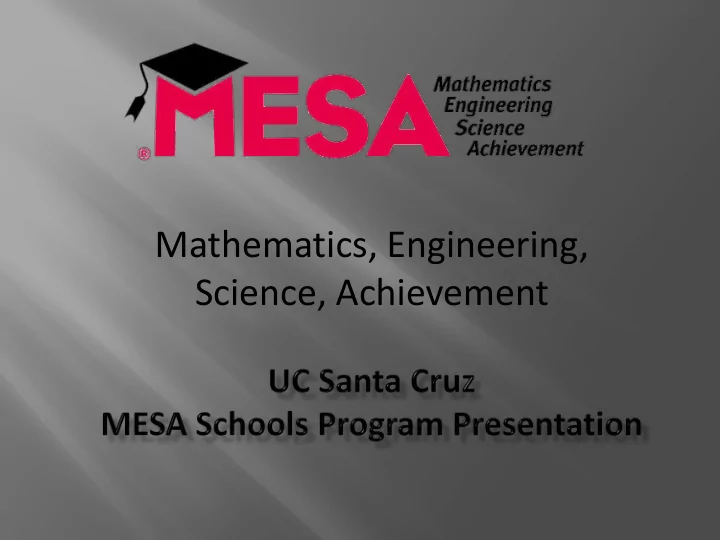

Mathematics, Engineering, Science, Achievement
• What is MESA? • Statistical Perspective • MESA’s Success Rates • MESA Participants • Our Services • Benefits of MESA
MESA enables educationally disadvantaged students to prepare • for and graduate from a four-year college or university with a math-based degree in areas such as engineering, the sciences, computer science, and mathematics. Through MESA, students develop academic and leadership skills, • increase educational performance, and gain confidence in their ability to compete professionally. MESA has particular interest in and focus on the students from those groups who historically have had the lowest levels of attainment to a four-year and graduate level programs. By closing this achievement gap, MESA students and graduates • will be better able to make significant contributions to the socioeconomic well-being of their families and their communities.
A college degree is a lot more than just a piece of paper. Below are numbers that reflect the average weekly income of individuals based on their educational attainment: $1,735 professional degree • $1,624 doctoral degree • $1,300 master’s degree • $1,066 bachelor’s degree • $785 associate’s degree • $727 some college, but no degree • $652 high school diploma • $471 no high school diploma • (Source: US Bureau of Labor Statistics, 2013.)
California leads the nation in science and technology advances. Despite this, it’s • been determined that in order for California to keep this position, it will be critical to produce more graduates in the math, science, and technology fields. The Labor and Workforce Development Agency projects a state shortfall of • almost 40,000 engineers by 2014. Around the nation, 50% of the country’s scientists and engineering professionals • are approaching retirement. In order to meet these high needs, California’s students must be better prepared • academically, and that is where MESA has been successful.
Of MESA high school graduates, 54% went on to major in math, science, and engineering. (Source: “MESA: Beating The Odds,” MESA Statewide Office, www.mesa.ucop.edu)
Who is eligible to participate in MESA? Educationally disadvantaged students are eligible for the program. The criteria for educationally disadvantaged include factors such as economic status, educational environment, or family/home circumstances. How many students does MESA serve? Between Santa Cruz and Monterey counties, our program serves over 700 students. Currently, there are 16 schools working with our program.
The MESA Model includes a variety of services that result in high rate of academic achievement. Components include: Individual academic plans • Hands-on math, engineering, and science activities • MESA Day competitions • Academic counseling • Field trips to university campuses • Special presentations • Parent workshops •
MSP Models: MESA Period • -offered during the regular scheduled school day After School Program • - students meet once or twice a week after school Saturday Meetings • - students meet once or twice a month on a Saturday (only at Watsonville High School)
Students have exposure to university requirements • and career options Students have exposure to university student life • Students are academically prepared for college • Students will interact with college students and • professionals in industry
Parents have contact with MESA advisor and are encouraged • to monitor their student’s progress Parents gain peace of mind knowing that their student will • have an academic experience which will supplement regular course work Parents have the opportunity to learn about college or • career choices that impact the future of their student Parents will be notified of available financial aid and • scholarship workshops
Please feel free to contact us to receive additional information about our program. Alexandria Leckliter Ana Rodarte MESA Director MESA Academic Coordinator 831-459-1760 831-459-1819 alexand@ucsc.edu ankhmdnz@ucsc.edu
Recommend
More recommend